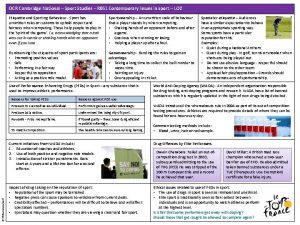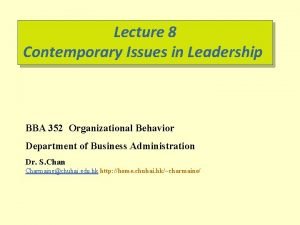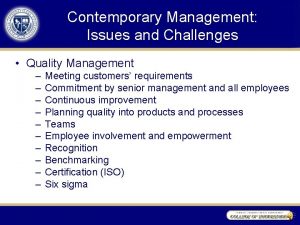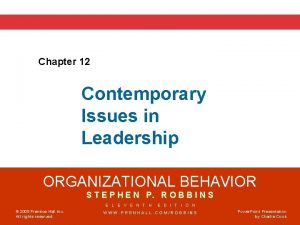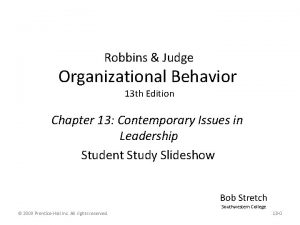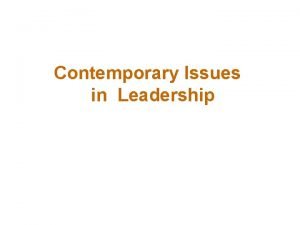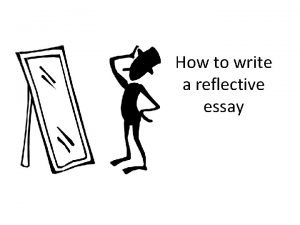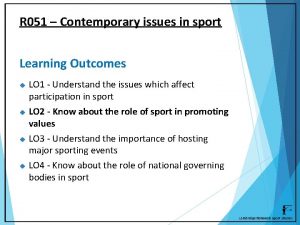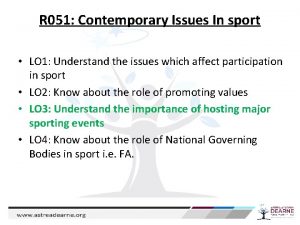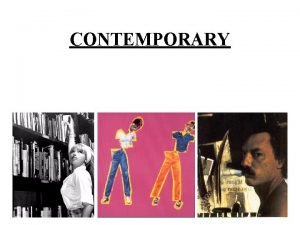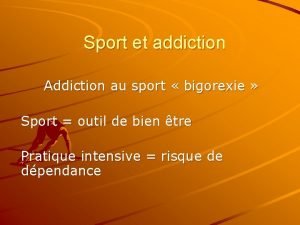R 051 Contemporary issues in sport Learning Outcomes


















































- Slides: 50

R 051 – Contemporary issues in sport Learning Outcomes LO 1 - Understand the issues which affect participation in sport LO 2 - Know about the role of sport in promoting values LO 3 - Understand the importance of hosting major sporting events LO 4 - Know about the role of national governing bodies in sport

Role of Sport in Promoting Values Watch me What is meant by a ‘Value’? Name and explain values that are promoted through sport.

Role of Sport in Promoting Values are principles or standards of behaviour that are judged to be of importance. Sport is a great way to encourage these values to be displayed and reinforced. Typical values include: 1. Team Spirit: All aspects of life require you to work with and get along with other people. Sport encourages working together with other individuals towards a common goal. i. e. winning a match. Think. Pair. Share – Which sport/s encourage the value of team spirit the most? Why?

Role of Sport in Promoting Values 2. Fair Play: Life has rules, legal, social, moral and ethical, that we must abide by. Learning the importance of adhering to rules and being fair to others can be achieved through playing sport. 3. Citizenship: Sport creates a feeling of belonging and helps to create/maintain pride in surroundings and a desire to be socially responsible. This value is promoted by getting involved in local community sport clubs.

Role of Sport in Promoting Values 4. Tolerance and Respect: Tolerance is needed in order to cooperate and get on with other people. Physical activity can develop an understanding of other people, countries and cultures.

Role of Sport in Promoting Values 5. Inclusion: Everyone has differing abilities/needs and society should accommodate these as best it can. Adapting sport so that people of all abilities can participate makes it inclusive. 6. Excellence: Sport creates opportunity for individuals to strive to be the best they can be.

Role of Sport in Promoting Values 7. National Pride: National pride fosters positive self image and pride in achievements and surroundings. Supporters and performers unite behind the country/team. i. e. World Cup 2018 and England. Think. Pair. Share – Does hosting a major sporting event give the home country additional benefits?

The Olympic and Paralympic Movement The ancient Olympics games were held in Greece but developed into the Modern Olympic Games in 1896. The Olympic games was developed by Baron Pierre de Coubertin. He believed in a healthy/balanced mind and body and encouraging performers to strive to do their best. The Olympic creed (message) was as follows: "The most important thing in the Olympic Games is not to win but to take part, just as the most important thing in life is not the triumph but the struggle. The essential thing is not to have conquered but to have fought well"

The Olympic and Paralympic Movement The aims of the Olympic Games are: 1. To promote the development physical and moral qualities using sport. 2. To bring athletes from around the world together. 3. To educate young people through sport, developing friendship and a more harmonious world. Unfortunately, in recent Olympic Games these have not always been adhered to amidst cheating, corruption and bribes.

The Olympic and Paralympic Movement The symbol of the Olympic Games is five interlocking rings of the same size which represent the union of the five continents.

The Olympic and Paralympic Movement Values How the Olympics and Paralympics encourage these values Respect Excellence Friendship Courage Determination Inspiration Equality Think. Pair. Share – Explain how the Olympic games encourages these values amongst the participants?

The Olympic and Paralympic Movement Olympic and Paralympic Games values: The Olympics games values are central to the movement and have been retained over many years. Respect – for all countries, cultures and other performers Excellence – Achieve the best you can. Friendship – promotion of friendly competition Courage – this is pushing yourself even when it gets tough. Determination – Perseverance to succeed despite barriers. Inspiration – role models to inspire the next generation. Equality – all nations have equal opportunities.

Other Initiatives to Promote Values There are other programme which have successfully promoted the development of core values amongst children and adults: • ‘Football for Hope’ campaign launched by FIFA. • ‘Chance to Shine’ from the England Cricket Board. • Sport Relief • ‘Creating Chances’ from the Premier League • ‘This Girl Can’ – Sport England initiative. Think. Pair. Share – Are there any other campaigns in sport which promote core values?

Etiquette and Sporting Behaviour Sport has unwritten rules or customs to uphold respect and fairness when competing. These help people to play in the 'spirit of the game'. They often require players to take an active approach to respect and fairness, not just avoid breaking the rules. i. e. acknowledging that a ball was out in tennis or shaking hands with an opponent even if you lose. By observing the etiquette of sport participants are safe and the core values are promoted.

Etiquette and Sporting Behaviour Sportsmanship an set of unwritten rules or code of behaviour that a player stands by when competing. Each sport has its own code of behaviour and ‘sportsmanship gestures’. Think. Pair. Share – How many different displays of sportsmanship, fairness or etiquette can you think of?

Etiquette and Sporting Behaviour There are places or times in a game situation or competition when sporting gestures are expected to take place. After an injury in football - The ball is kicked out after an injury occurs to a player. The ball is then thrown back. Respect in rugby – After a match both teams form a ‘tunnel’ and clap each other off.

Etiquette and Sporting Behaviour With success – Even as a winning team players should be gracious. Shaking hands is an offer of commiseration. After a defeat – Even after loosing a match player should shake hands and show mutual respect.

Etiquette and Sporting Behaviour Gamesmanship is slightly different to sportsmanship as it is the bending the rules to gain an advantage over opponents. Usually a tactical and unethical ploy. i. e. fainting an injury in football to waste time. Think. Pair. Share – Can you think of any other examples of gamesmanship within sport?

Etiquette and Sporting Behaviour Other acts of gamesmanship in sport are below: • Taking injury time outs during a tennis game. • Over appealing in cricket. • Standing in front of a snooker players shot line.

Etiquette and Sporting Behaviour Sporting behaviours are not just for the participants but extend to the spectators too. Certain sports have a reputation for high levels of spectator etiquette i. e. crowd silence during a golf shot. Think. Pair. Share – Can you think of any other examples spectator etiquette?

Etiquette and Sporting Behaviour Other examples of spectator etiquette include: • Quiet during a National Anthem - In football when the opposition national anthem is played the crowd are quiet. • Quiet during play - In tennis or snooker when shots are being played out. • Do not use abusive language - Rugby fans are supportive of their own team but respectful of the other team. • Applaud fair play/opposition – Crowds should applaud when performers demonstrate acts of sportsmanship.

Etiquette and Sporting Behaviour There are numerous sporting initiatives that have been introduced to reduce negative sporting behaviour and promote sportsmanship and etiquette. Participants – Respect campaign Spectators - Kick Racism Out of Football

Use of Performance-Enhancing Drugs in Sport Watch me What sports or athletes have been involved in recent incidents of drug taking in sport?

Use of Performance-Enhancing Drugs in Sport Performance enhancing drugs are substances that are used to improve any form of athletic performance. The rewards that come with winning are so great that athletes are increasingly temped to cheat with the use of drugs. Think. Pair. Share – Why do sportspeople take drugs?

Use of Performance-Enhancing Drugs in Sport 1. Pressure to succeed as an individual Elite athletes are under a huge amount of pressure from competitors, coaches, family and themselves to win. This pressure can cause individuals to make poor decisions/judgements. 2. Pressure as a nation is increasingly common and is linked to politics especially during home games or events. A nation’s success and can lead to politicians gains. The Russian athletics scandal highlights the pressure placed on coaches to produce gold medal winning performances.

Use of Performance-Enhancing Drugs in Sport 3. Rewards In today’s sport, winning and success leads to a higher profile, increased appearance fees and lucrative sponsorship deals. Prize money/fame can motivate athletes to cheat and take performance enhancing drugs.

Use of Performance-Enhancing Drugs in Sport 4. To match the competitors In some events drug abuse has become so common that athletes often say ‘if everyone else is, then I will follow in order to keep up’ It is difficult to constantly detect new drugs being used by athletes and some believe doping is just a part of sport. i. e. Over the last decade the Tour de France has had widespread drug doping problems.

Use of Performance-Enhancing Drugs in Sport Athletes should be aware that doping can have severe health and social consequences. Reasons against drugs use includes: 1. Performers gain an unfair advantage and undermines the integrity of sport. 2. The consequences of being found guilty are large fines/ bans and significant reputation damage. 3. The health risks to the performer are clear ranging from organ defects to severe long lasting damage to the body.

World Anti-Doping Agency (WADA) WADA is an independent organisation responsible for drug testing, anti-doping programs and research. WADA has a list of banned substances which is regularly updated in the light of new drugs being detected. Think. Pair. Share – What can WADA do to reduce the number of drug cheats in sport?

World Anti-Doping Agency (WADA) WADA introduced the whereabouts rule in 2004 as part of its out of competition testing procedures. Athletes are required to provide details of where they can be found for one hour every day. While this rule inevitably creates some inconvenience for professional athletes it is the responsibility of the individual to be where they state they are and keep this personal information up to date.

World Anti-Doping Agency (WADA) Regular and random drug testing during and out of competitions will help to deter cheats. Advanced research into new ‘undetectable’ drugs will help to eliminate laboratories who manufacture the illegal drugs used by performers.

World Anti-Doping Agency (WADA) WADA have also developed the methods of testing for performance enhancing drugs. Common methods include: • Blood sample • Urine sample • Hair sample • Nail sample

World Anti-Doping Agency (WADA) Current initiatives from WADA include the Education of coaches and athletes to raise awareness of the risks and consequences associated with doping. All governing bodies will have an antidoping program and will visit training institutes and schools to educate young potential athletes. Using both positive and negative role models can help deliver this message.

World Anti-Doping Agency (WADA) Another strategy in the fight against drugs in sport is the introduction of stricter punishments. In 2015, WADA increased bans to 4 years and a lifetime ban for a second offence. Medals have also been striped from athletes retrospectively and bans extended to coaches too.

Drug Offences by Elite Performers Dwain Chambers: Chambers failed an out-of-competition drug test in 2003, subsequently admitting to the use of THG, a performance enhancing substance, for which he was banned from athletics for two years. He was stripped of the 100 m European title and record he achieved that year but has since returned to competition and won gold in the 4× 100 m in 2006. Watch me What reasons does Dwain Chambers state for him taking performance enhancing drugs?

Drug Offences by Elite Performers David Millar: Millar was a British road race champion who served a two-year doping ban for use of EPO. He has also admitted taken banned substances under a TUE (Therapeutic Use Exemption) certificate for a fake injury. David Millar now works with WADA and the UCI to educate performers about drug use in cycling.

Consequences and implications of doping Sports that have been constantly linked to cases of drug taking have had their reputation damaged. As a result it can be difficult to gain sponsorship deals and will lose public following. Negative press can cause sponsors to withdraw from deals due to their brand being associated and called into question. Sports are under increasing pressure to ensure it has a clean image. This has resulted in harsher punishments and stricter testing procedures.

Consequences and implications of doping Damage to the Tour de France competition has been widespread over the past 10 years with numerous reported cases of doping and even death. These damages are: • Reputational – a sport can become known for cheating and may affect young people taking it up. • Credibility linked – performance will be difficult to believe and will affect the number of spectators.

Consequences and implications of doping Elite sport is traditionally seen as fair contest between individuals and is an opportunity to watch athletes perform at the highest level. Society cannot accept or condone acts of drug taking/doping in sport without individual’s being challenged. Such behaviours go against the cultural norms and values of society.

Consequences and implications of doping Many sports performers use legal substances to maximise training and performance. This includes vitamins, minerals, bicarbonate, carbohydrate gels/drinks and creatine based supplements. These are accepted by sport as they do not significantly enhance performance or affect the health of an athlete. Little is known of the long term effects of prolonged use of legal supplements.

Consequences and implications of doping For • Spectators want to see the best performance possible • Used correctly there is limited health risk • Performers don’t ask to be role models • Level playing field for all performers • Saves money/time on expensive testing/money could be used for elsewhere • Testing always one step behind the cheats /chemists/technology Against • Proven health risks / side effects • Not all performers have access to doping methods/can afford drugs • Against nature of sport / unethical / cheating / contract to compete/ not use of natural ability • Negative role model for children / wider implication for society

Consequences and implications of doping Think. Pair. Share – Should all drugs be banned in sport?

Consequences and implications of doping Many arguments can be made for allowing drug taking by athletes. Presently the fight against drugs in sport continues. For Against Think. Pair. Share – Should we lift the ban on drugs in sport? What reasons can be given for both arguments?

Consequences and implications of doping Advantages and disadvantage of taking legal substances: Advantages Disadvantages • Provides a boost to health and well-being. • Can help recovery process and building muscle. • Available in a range of formats which make it easier to administer. • Increased chances of success. • Some supplements may contain banned substances or are not what they seem to be. • Research has yet to confirm if there is any long term effects of persistent usage. • Many energy drinks are high in sugar and other health issues such as obesity or tooth decay might prevail. • Not in the spirit of fair play in sport.

Retrieval Practice Name 3 values promoted by sport and examples of each. Discuss possible methods that could be used to more effectively deter the use of performance-enhancing drugs. Role of sport in promote values Explain Olympic movement and the values it instils. Is this still true today? Explain the difference between sportsmanship and gamesmanship and some common spectator etiquette observed in sport.

Exam Question Application 1. Give two examples of sportsmanship and explain why it is important in sport. (4) (a). . . . . . . …………………………………………………. . . (b). . . . . . . …………………………………………………. 2. What do the initials WADA stand for? (1) ………………………………………………….

Exam Question Application 3. Which one of the following best describes the values that are promoted by the Olympics? (1) a) To win at all costs b) To become famous by taking part in the Games c) To promote fair play, excellence and respect d) To gain a new personal sponsorship deal.


Exam Question Application Marks Scheme: 1. When someone gets injured during a football match players will send the ball out of play even when it is a player from the opposition who is injured. 2. When this happens it is usual for the team who has had the injured player to throw the ball to the opposition if they sent the ball out so that the player could be treated for the injury. 3. Shake hands with the opposition/official at the end of the game 4. Acknowledge that you have committed a foul which the referee may not have seen (e. g. admitting that you have touched the ball with your sleeve in snooker; a batsman ‘walking’ when he knows that he touched the ball with his bat and it was caught) 5. Fairness to ensure a fair result and protect the integrity of the sport 6. Promoting values, respect for others 7. To ensure the safety of participants 8. Sets a good example to young people who see participants as role models 2. World Anti-Doping Agency

Exam Question Application Marks Scheme: 3. To promote fair play, excellence and respect 4. • Team spirit (e. g. /explanation) learning how to work together with and support others by playing as part of a team. • Fair play (e. g. /explanation) learning the importance of adhering to rules and being fair to others through playing sport. • Citizenship (e. g. /explanation) get involved in your local community through sport. • Tolerance and respect (e. g. /explanation) developing understanding of different countries and cultures through sport. • Inclusion (e. g. /explanation) initiatives to get underrepresented social groups involved in sport. • National pride (e. g. /explanation) supporters and performers unite behind country in international events. • Excellence (e. g. /explanation) striving to be the best that you can in your favourite sport
 Ocr sports studies
Ocr sports studies How do national governing bodies promote sport
How do national governing bodies promote sport Din 31051 instandhaltung
Din 31051 instandhaltung What is contemporary health issues
What is contemporary health issues Erp in supply chain management ppt
Erp in supply chain management ppt Contemporary leadership issues
Contemporary leadership issues What are contemporary management issues
What are contemporary management issues Contemporary issues in marketing
Contemporary issues in marketing Contemporary issues in hrm
Contemporary issues in hrm How does rentals affect filipino entrepreneurs
How does rentals affect filipino entrepreneurs Contemporary issues in managing change
Contemporary issues in managing change Contemporary issues in tourism meaning
Contemporary issues in tourism meaning Contemporary issues in engineering
Contemporary issues in engineering Contemporary issues in marine insurance
Contemporary issues in marine insurance Contemporary issues in marketing
Contemporary issues in marketing Contemporary tourism issues
Contemporary tourism issues Contemporary issues in managing change
Contemporary issues in managing change Log 470
Log 470 Behaviour modifier
Behaviour modifier Historical and contemporary issues in nursing
Historical and contemporary issues in nursing Contemporary issues in information systems
Contemporary issues in information systems Contemporary issues in organizational behavior
Contemporary issues in organizational behavior Contemporary issues in planning
Contemporary issues in planning Contemporary issues in planning
Contemporary issues in planning Contemporary issues in auditing
Contemporary issues in auditing Meaning of contemporary issues in accounting
Meaning of contemporary issues in accounting Contemporary leadership issues
Contemporary leadership issues Contemporary leadership issues
Contemporary leadership issues Contemporary food issues
Contemporary food issues Contemporary issues in tourism
Contemporary issues in tourism Controversial sports issues
Controversial sports issues Legal issues in sport/event marketing match-up
Legal issues in sport/event marketing match-up Learning outcomes examples english
Learning outcomes examples english Water cycle learning outcomes
Water cycle learning outcomes Notice writing objectives
Notice writing objectives Swot analza
Swot analza Objective of rhymes
Objective of rhymes Planning goals and learning outcomes
Planning goals and learning outcomes Photolysis in photosynthesis
Photolysis in photosynthesis Learning objectives of nutrition in plants class 7
Learning objectives of nutrition in plants class 7 Ncbts
Ncbts Objectives of linear equations in one variable
Objectives of linear equations in one variable Learning outcome generator
Learning outcome generator Reported speech learning objectives
Reported speech learning objectives Purpose of learning outcomes
Purpose of learning outcomes Purpose of output devices
Purpose of output devices Biological level of analysis
Biological level of analysis How to write reflective essay
How to write reflective essay Learning outcomes of holy week
Learning outcomes of holy week Learning outcomes of holy week
Learning outcomes of holy week Head start early learning outcomes framework
Head start early learning outcomes framework
